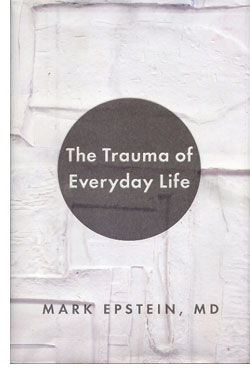 |
 |
 Mark Epstein, MD
Mark Epstein, MD
The Trauma of Everyday Life
Penguin Press / Penguin Putnam
US Hardcover First Edition
ISBN 978-1-594-20513-2
Publication Date: 08-16-2013
226 Pages; $23.95
Date Reviewed: 09-30-2013
Reviewed by: Rick Kleffel © 2013
Mystery
Non-Fiction
Trauma, we hope, calls attention to itself. It stands out in the course of our experience, at least some of our experience. It's an exception, an interloper that comes and goes with easily detectable fanfare. We create rules to keep trauma at bay.
But what if trauma is itself a rule? It does not take much of a twist of the vision to encompass this understanding. Our rules to keep it at bay are without use, while the comings and goings are far less easy to trace. How then can we learn to live with the unlivable? It would be nice to think of trauma as rare, but once we consider it, rarity becomes an unattainable wish. Avoidance is not going to work. We have to come up with a means of encompassing trauma.
In 'The Trauma of Everyday Life,' Mark Epstein, MD combines a modern psychological look at the life of Buddha with a fresh examination of trauma to give readers a powerful new understanding of just what it is that bedevils our lives. Trauma is much more common than we might wish, but it need not be the devastating blow that we imagine. Reading 'The Trauma of Everyday Life' is a great showcase for the act of reading itself. Words, properly arranged, can re-train the mind.
Epstein is up to a very difficult task here, but his path is relatively simple. Looking at the life of the Buddha from a modern, psychological perspective, he examines the role of trauma, both big and small, in the Buddha's path to enlightenment. There, he finds many parallels to pitfalls we face, and unhelpful responses that cloak pain with avoidance. We are buffeted throughout our lives by problems both immense and small. But scale is not so important as we might think. How we manage our response is — and the Buddha has much to say on the matter, especially in the keen analytical light provided by Epstein.
Don't think that 'The Trauma of Everyday Life' is simply a feel-bad-to-feel-good Buddhist tract. Epstein offers some careful analysis of the import of parents by way of D. W. Winnicott, who coins the terms "good-enough mother" and "good-enough father." Epstein is a fine writer, who can cut a clear swathe through a pretty academic analysis. The reading experience of this book is well-considered and engaging, even when Epstein is diving into the kind of psychological complexity required to untie the painful truth.
For all that 'The Trauma of Everyday Life' offers a reading experience that is meant and manages to help the reader, it never feels like a tome of unasked-for advice or unwelcome solutions for thorny problems. The way out through trauma is to dive in. Mark Epstein's book makes this a matter of language and offers his readers a look at solutions both modern and ancient, but more pertinent every second.
|
 |
|
|
 |
| |
Review Archive
All Reviews alphabetized by author.
General Fiction
Non-Genre, general fiction and literature.
Horror
Supernatural fiction, supernatural horror and non-supernatural horror.
Science Fiction
Science fiction, science fantasy, speculative fiction, alternate history.
Fantasy
Fantasy, surrealism and magic realism.
Mystery
Crime, thrillers, mystery, suspense.
Non-Fiction
Non-Fiction, True Crime, Forteana, Reference.
Poetry
|
|
 |
|




